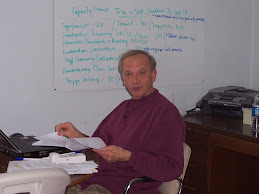The following day, I visit a soup kitchen where more than 200 people, about two thirds of whom are children, come to eat four times a week. The mothers of the children seem competitive, and almost frantic, to make sure their children get their share. A child I meet, a five-year-old boy named Emmanuel, tells me he's "in kiddie garden." His mother says he hasn't started yet. "He starts next year."
"You have to remember," says one of the priests with whom I share my thoughts about these meetings, "that for this little boy whom you have met, his life is just as important, to him, as your life is to you. No matter how insufficient or how shabby it may seem to some, it is the only one he has"-an obvious statement that upsets me deeply nonetheless.
- Jonathan Kozol, Amazing Grace
Then the master told his servant, 'Go out to the roads and country lanes and make them come in, so that my house will be full.’ - Luke 14:23
I think about the eagerness of the children of our community to join a prayer circle. Whether it is before a meal, or at the end of a meeting, as soon as the circle begins to form the kids are in it with enthusiasm. More often than not, they are the ones who lead in prayer. This fellowship, everyone holding hands together, is a powerful symbol of the Gospel.
I have been grappling with defining a short theme which will summarize my reason for standing for Moderator of the 218th General Assembly of the Presbyterian Church (U.S.A.). The most suggested, and the one which has been our core at Meeting Ground for years, is: “the table. ” “There is always room for one more at our table.” The symbol, of course, is the table itself – but the meaning is best expressed in the symbolism of “room.”
How often this is a figure of Jesus’ own ministry. Synonymous with the story of his birth is the phrase “no room” at the inn. His most powerful parable, the Good Samaritan, is the simple story of a social outcast who purchased room in an inn to help a wounded traveler. Most frequently, is the space Jesus made in his life, heart, and in his relationships for everyone – persons of all social standing, but particularly those who were hurt, outcast, desperate, and alienated. Jesus employed the use of the space of his life, room in his heart, as the most powerful symbol of his own mission. If it was his, then it must be ours.
Among the powerful examples, the great banquet is literally the story of a table at which there is room due to guests not showing up. The emphasis is on filling the empty seats, and final command is that the room be utilized by combing highways, byways, and hedges for those considered least worthy and welcome so that “the house may be full.” It is interesting how Jesus moves from filling a table to filling a house.
My long ministry with Meeting Ground has taught me a lot. Two things stand out above everything, however. The gospels come alive, I think because so many of the persons and relationships experienced in mission activity are so similar to those we read in the gospels. There is the clear realization that mission is not so much a program, but people – ourselves, our faith in life, and our relationships with others.
Yet, the parable also implies urgency. The table must be filled, and the command to do it is clear and unequivocal. The persons of our community at Meeting Ground often face life threatening situations, but the urgency is also about a quiet, loud cry to recognize the importance, the deep significance of their life.
Wednesday, March 12, 2008
Subscribe to:
Post Comments (Atom)

1 comment:
Carl, your thought of "always room for one more at the table" reminds me of my favorite line from the PCUSA Partnership policy paper, "Presbyterians Do Mission in Partnership." The line is that we seek "ever-expanding webs of relationships."
I love that image and wording - the outward pulse of the Gospel, the commitment to grow and reach beyond who we already are. Such a commitment stands in contrast to status-quo contentment, churchy-cliques that are effectively closed to new people.
Thanks for the thoughts you shared.
Dave Hackett
Post a Comment